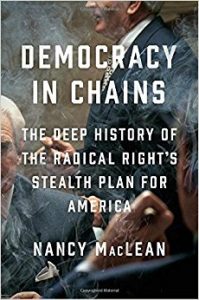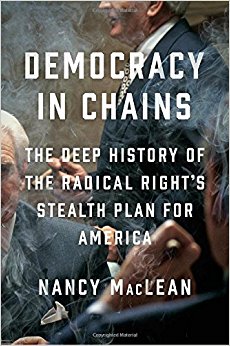
By Mark Karlin
Truthout (7/9/17)
When and how were the seeds sown for the modern far-right’s takeover of American politics? Nancy MacLean reveals the deep and troubling roots of this secretive political establishment — and its decades-long plan to change the rules of democratic governance — in her new book, Democracy in Chains: The Deep History of the Radical Right’s Stealth Plan for America. Get your copy by making a donation to Truthout now!
Many individuals who follow politics and journalists think that the right-wing playbook began with the Koch brothers. However, in her groundbreaking book, Nancy MacLean traces their political strategy to a Southern economist who created the foundation for today’s libertarian oligarchy in the 1950s.
Mark Karlin: Can you summarize the importance of James McGill Buchanan to the development of the modern extreme right wing in the United States?
Nancy MacLean: The modern extreme right wing I’m talking about, just to be clear, is the libertarian movement that now sails under the Republican flag, particularly but not only the Freedom Caucus, yet goes back to the 1950s in both parties. President Eisenhower called them “stupid” and fashioned his approach — calling it modern Republicanism — as an antidote to them. Goldwater was their first presidential candidate. He bombed. Reagan, they believed, was going to enact their agenda. He didn’t. But beginning in the early 2000s, they became a force to be reckoned with. What had changed? The discovery by their chief funder, Charles Koch, of the approach developed by James McGill Buchanan for how to take apart the liberal state.
The billionaire-backed right necessarily gives comfort to white supremacists.
Buchanan studied economics at the University of Chicago and belonged to the same milieu as F.A. Hayek, Milton Friedman and Ludwig von Mises, but he used his training to analyze public life. And he supplied what no one else had: an operational strategy to vanquish the model of government they had been criticizing for decades — and prevent it from being recreated. It was Buchanan who taught Koch that for capitalism to thrive, democracy must be enchained.
Buchanan was a very smart man, the only winner of the Nobel Prize in Economics from the US South, in fact. But his life’s work was forever shaped by the Supreme Court’s Brown v. Board of Education decision. He arrived in Virginia in 1956, just as the state’s leaders were goading the white South to fight the court’s ruling, a ruling he saw not through the lens of equal protection of the law for all citizens but rather as another wave in a rising tide of unwarranted and illegitimate federal interference in the affairs of the states that began with the New Deal. For him what was at stake was the sanctity of private property rights, with northern liberals telling southern owners how to spend their money and behave correctly. Given an institute to run on the campus of the University of Virginia, he promised to devote his academic career to understanding how the other side became so powerful and, ultimately, to figuring out an effective line of attack to break down what they had created and return to what he and the Virginia elite viewed as appropriate for America. In a nutshell, he studied the workings of the political process to figure out what was needed to deny ordinary people — white and Black — the ability to make claims on government at the expense of private property rights and the wishes of capitalists. And then he identified how to rejigger that political process not only to reverse the gains but also to prevent the system from ever reverting back. He sought, in his words, to “enchain Leviathan,” which is why I titled the book Democracy in Chains.
Why, until your book, has his importance to the right wing been largely overlooked?
There are a few reasons Buchanan has been overlooked. One is that the Koch cause does not advertise his work, preferring to tout the sunnier primers of Hayek, Friedman and even Ayn Rand when recruiting. Buchanan is the advanced course, as it were, for the already committed. Another is that Buchanan did not seek the limelight like Friedman, so few on the left have even heard of him. I myself learned of him only by serendipity, in a footnote about the Virginia schools fight.
His importance to the right wing could only be identified by working through the archival sources that provide context for his published work. That’s what I did after discovering that Buchanan had urged the full privatization of Virginia’s public schooling in 1959, and then learning that he later advised the Pinochet regime on a capital-protecting constitution that could withstand the end of the dictatorship. Even with both of those data points, I don’t think I could have gleaned the full import of his project had I not moved to North Carolina in 2010, where a strategy informed by his thought has been applied with a vengeance by the veto-proof Republican legislative majority that came to power in the midterms that fall. After Buchanan died in 2013, I was able to get access to his private papers at George Mason University, where the documentation is incontrovertible.
In fact, Buchanan’s records provided a kind of birds-eye view into collaboration between the corporate university and right-wing donors that at least I have never seen before, and I’ve done a lot of research in this area over the last two decades.
How would you draw a line connecting Buchanan to the Koch brothers?
Charles Koch supplied the money, but it was James Buchanan who supplied the ideas that made the money effective. …

